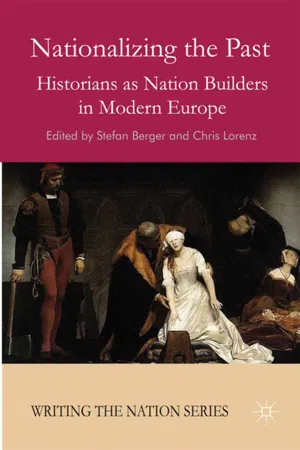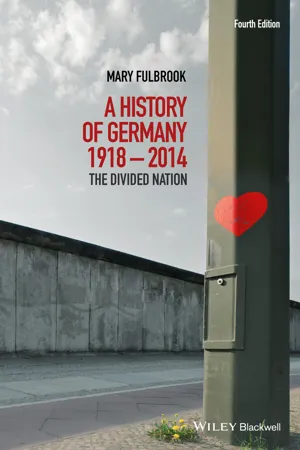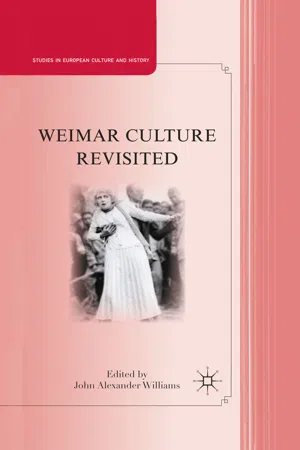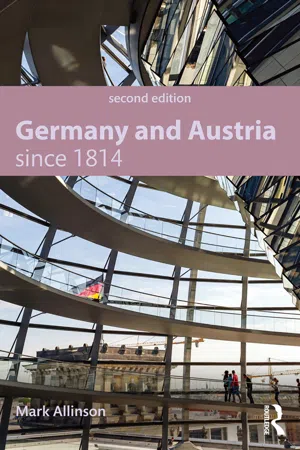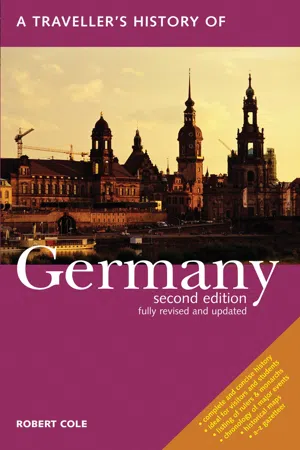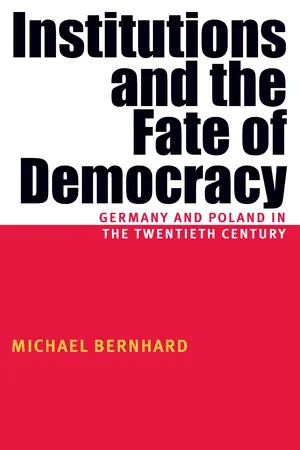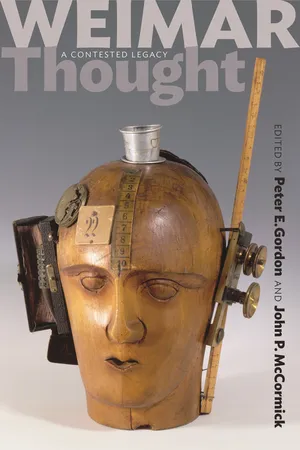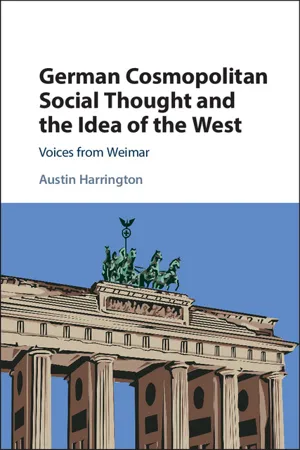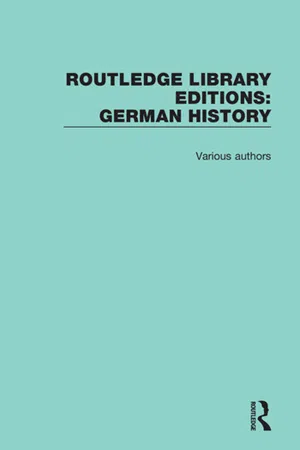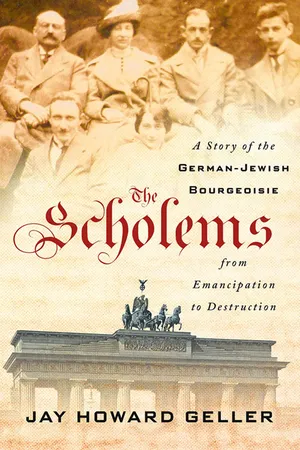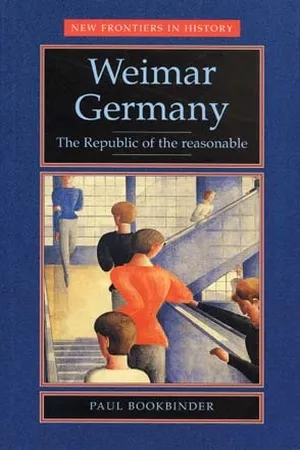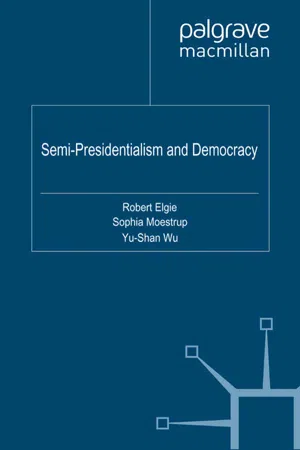History
Weimar Republic
The Weimar Republic refers to the democratic government established in Germany after World War I, lasting from 1919 to 1933. It faced significant challenges, including economic instability, political extremism, and social unrest. Despite its efforts to promote democracy and modernization, the Weimar Republic ultimately succumbed to the rise of Adolf Hitler and the Nazi Party.
Written by Perlego with AI-assistance
Related key terms
1 of 5
12 Key excerpts on "Weimar Republic"
- eBook - PDF
Nationalizing the Past
Historians as Nation Builders in Modern Europe
- S. Berger, C. Lorenz, S. Berger, C. Lorenz(Authors)
- 2016(Publication Date)
- Palgrave Macmillan(Publisher)
As recent studies have argued 64 , in the public debate after the Second World War, ‘Weimar’ generally served as a counter-image to the new democracy. For politi- cians, journalists and educators alike, Weimar symbolized the fatal trinity of political instability, economic disaster and fierce social conflict. Consequently, they used Weimar as a standard against which they measured the achievements of, and threats to, the new democracy. The narratives examined above indicate how deeply entrenched this perspective has been in historical research; and that it prevailed well into the 1990s. Thus, the reflection on Weimar had a stabilizing role, buttressing the new political and social order of the Federal Republic of Germany in the realm of historiography and historical thought. Simultaneously, by framing the history of the first Republic from the angle of its destruction, historians have confined Weimar to being the pre-history of the ‘Third Reich’. After all, it was the experience of National Socialism that led historians to place Weimar’s end at the centre of its history and thereby pro- foundly shaped historical thinking about Germany’s first Republic. Theoretically, there is no reason why it should not be possible to perceive and structure the history of Weimar in a different way. Some texts of the 1960s seem to suggest an alternative, focusing on the Revolution in 1918–19 and accentuating the missed chances for democratization. 65 However, an interpre- tation stressing Weimar’s potential as a liberal order never emerged. Even so, it would be conceivable to tell the story of Weimar not by describing the tragic chain of political events, but by focusing on other developments: the jettison- ing of authoritarian structures in a number of social domains, the plurality of lifestyles and forms of cultural expression, the level of social modernity, and the explosion of artistic energies. - eBook - PDF
A History of Germany 1918 - 2014
The Divided Nation
- Mary Fulbrook(Author)
- 2014(Publication Date)
- Wiley-Blackwell(Publisher)
The Weimar Republic 39 In every possible way, the nature and possibilities of modernity were contested, challenged, reshaped. For a few brief years, manifold possibilities for creating a different future fought to achieve dominance. Conflicting visions of the future and critiques of the present battled alongside and against each other, in an effort to create not only a new society, but also to reshape the very nature of what it meant to be human. Yet this battle was fought in highly unstable political and economic conditions. The fragility of the social compromise that marked the beginning of Weimar democracy became all too evident when it was rocked by the shocks of world depression. Whatever the ambiguities of Weimar society and culture, perhaps the deep- est and most fatal splits were embedded in the Weimar social compromise, and in the institutional framework of relations between the classes. It was these which contributed mightily to the breakdown of the Weimar political system, creating the opportunities which the Nazis were to seize. We must turn now to the complex and contentious task of explaining the ultimate collapse of the short-lived Weimar Republic. A History of Germany 1918–2014: The Divided Nation, Fourth Edition. Mary Fulbrook. © 2015 John Wiley & Sons, Ltd. Published 2015 by John Wiley & Sons, Ltd. The Collapse of Democracy and the Rise of Hitler Two rather different processes coincided in the late 1920s and early 1930s. One was the collapse of the democratic political system of the Weimar Republic. The other was the rise of Hitler’s Nazi Party, immeasurably aided by the economic depression after 1929. The collapse of democracy effec- tively preceded, and was an essential precondition for, the rise of Hitler; and the appointment of Adolf Hitler to the chancellorship of Germany was by no means the only possible, or inevitable, outcome of the collapse of Weimar democracy. - eBook - PDF
- J. Williams(Author)
- 2011(Publication Date)
- Palgrave Macmillan(Publisher)
VII Visualizing the Republic: State Representation and Public Ritual in Weimar Germany Nadine Rossol Visual impressions shape our perception of historical time periods and remind us of the importance of photographs, pictures, or films for the reconstruction of the past. 1 The term “Weimar culture” generally evokes a set of mental images, despite the fact that very few of us will have per- sonal experiences of 1920s Germany. Some of these snapshots are of the stunning Marlene Dietrich, the modern architecture of the Bauhaus, or Charleston-dancing girls in short dresses. Breathtaking cultural prosperity stands in sharp contrast to political turmoil and economic depression. In these images, Weimar Germany was crisis-ridden and exciting at the same time, although we need to keep in mind that the admiration of Weimar culture is in part a post-1945 phenomenon. 2 After the collapse of the Nazi regime, the limelight of Weimar culture shone even more brightly. The division into spectacular culture on the one hand and disastrous politics on the other has long impeded scholars from concentrating on an area in which the fusion of culture and politics was practiced—republican state representation. Attempts of the young repub- lic to promote its democratic state to the German population with the help of symbols, monuments, and festivities have long been neglected in historical research. Instead, republican representation has been negatively contrasted to the allegedly more successful Nazi propaganda. 3 Recently, historians have started to challenge this negative evaluation of Weimar Germany’s self-representation. 4 In what follows, I will argue that republican officials not only were well aware of the need to create a posi- tive impression of their young democratic state, but that they also applied 140 / nadine rossol highly innovative means to achieve this end. - eBook - ePub
- Mark Allinson(Author)
- 2014(Publication Date)
- Routledge(Publisher)
3 Weimar – a scapegoat republic 1918–33 DOI: 10.4324/9780203784938-3Timeline9 November 1918 Germany declared a republic 11 November 1918 Armistice ends the First World War 28 June 1919 Versailles Treaty signed 11 August 1919 Weimar constitution takes force March 1920 Kapp-Putsch 1923 Hyperinflation crisis 8–9 November 1923 Hitler’s ‘beer hall’ putsch attempt 26 April 1925 Hindenburg elected Reichspräsident October 1929 Wall Street Crash 29 March 1930 Collapse of parliamentary-based government 21 August 1930 Young Plan ratified to regulate Germany’s war reparations payments until 1988 30 January 1933 Hindenburg appoints Hitler as Reichskanzler The shock of the First World War transformed politics and society in the defeated countries. The fall of ancient dynasties left a vacuum, enabling those spearheading the new ideologies which had developed in the preceding decades to strive for power. Following the Russian Revolution of 1917, Lenin’s Bolsheviks began building a new Russia on the basis of Marxist socialism – an experiment which inspired the left throughout Europe, but initially failed to put down roots outside the old tsarist empire. Conversely, ‘anti-modern’ and nationalist, anti-Marxist visions of community brought fascists to power in Italy under Benito Mussolini by 1922 and inspired similar movements throughout the continent, some (as in Germany) with expansionist aims and strong overtones of racial superiority. Political radicalism was encouraged by democracy’s failure to master the difficult postwar economic conditions, particularly after the collapse of the American Wall Street markets in October 1929, which sparked a general recession.In 1918, Germany’s defeat in the First World War gave the country its first opportunity since 1848 to devise a democratic system for a national state unencumbered by Prussian dominance and the Kleinstaaterei of the old monarchical system. This vision proved unattractive to the many Germans who resented what appeared to be the imposition of democracy as the price of peace by a victorious foe (the United States of America), and particularly to the many who had prospered under the Kaiserreich - eBook - ePub
- Robert Cole(Author)
- 2014(Publication Date)
- Interlink Books(Publisher)
CHAPTER TENThe Weimar Republic, 1919-1933‘The Weimar Republic, Germany’s first bid for democracy, failed,’ wrote Holger Herwig. Why? Because the military and bureaucracy remained unchanged from the Second Empire, class interest and factionalism took precedence over national interest in both the political process and Reichstag proceedings, divisive economic issues were never fully resolved, and resentment over the Versailles Treaty, the ‘Germany was stabbed in the back by traitors at home’ argument, was never laid to rest. In the end, Weimar Germany accepted an Austrian, Adolf Hitler, as its leader.Making the Republic Wilhelm II abdicated on 9 November 1918. Chancellor Prince Max von Baden handed his office over to Majority Socialist leader Friedrich Ebert, and the Weimar Republic was born. CONSTITUENT ASSEMBLYEighty-three per cent of eligible voters turned out for the general election on 19 January 1919. The object was creation of a constituent assembly to both make a new constitution and govern the new Republic. The results revealed a divided Germany. No single party or even a coalition emerged with a majority: Majority Socialists won 165 seats, Independents 22, German Democrats (for which Albert Einstein voted) 75, the Centre 91, German Nationalists 44, and Populists (National Liberals) 19. Even so, on 10 February the assembly gave Ebert the presidency ofthe Republic by a margin of277 to 51. He then formed the ‘Weimar Coalition’ by assembling a government with members from left and centre.Making a constitution was the first item on the constituent assembly agenda. Law professor and liberal Hugo Preuss was assigned to get things started. He did, emphasizing democracy and parliamentary representation ‘with a high degree of centralization.’ This did not suit everyone, and the debates were fierce and divisive. The particularism that had been part of German history for more than a thousand years was far from dead, and the constitution finally agreed upon and ratified on 11 August 1919 combined a unitary state with recognition of at least the existence of individual states. The unitary principle was central to the first clause, titled ‘Reich and States,’ which opened with a line that to Herwig sounded like ‘a formula worthy of Alice in Wonderland’ It read: ‘The German Reich is a Republic. Political authority emanates from the people.’ The clause went on to specify that the German States (twenty-five in number and referred to as Länder) were required to submit to the authority of the Reich , to institute republican state governments, to recognize that sovereignty was concentrated in the nationally elected parliament, and to accept direct taxation being in the hands of the Reich. - eBook - PDF
Institutions And The Fate Of Democracy
Germany And Poland In The Twentieth Century
- Michael Bernhard, Michael H. Bernhard(Authors)
- 2010(Publication Date)
- University of Pittsburgh Press(Publisher)
German Democratic Party and the Center Party, were able to defeat a series of armed insurgencies by revolutionary leftists, convene the National Assembly, and write a constitution. The Weimar constitution created a bicameral parlia-ment for the republic. The major legislative work was done by the lower house, the Reichstag. Elections to the Reichstag were highly proportional with multi-candidate districts and a national list system to catch residual votes. There was also an upper chamber, the Reichsrat, which represented individual states ( Län-der ). Finally, the executive was semipresidential with a parliamentary-based chancellor and a directly elected president ( Reichspräsident ) with rather exten-sive emergency powers. The Beginnings of Democratization The event that initiated democratization in Weimar Germany was the collapse of the Kaiserreich in the concluding phases of the First World War. Since most knowledgeable readers will probably conceive of democratic transition in terms of the sort of negotiated transitions that have been common in the last three decades, an analytic discussion of the democratization following authoritarian collapse is in order. This review will be followed by an in-depth historical discus-sion of that process in Germany in the closing stages of the First World War. The sudden collapse of authority necessitates a complex set of tasks, rather di ff erent from the pattern of negotiated transitions that characterizes many contemporary cases. ¹ In conditions of an outright collapse of authority, the opponents of dictatorship are often left with no one with whom to negotiate. Thus, the fi rst task for democratic reformers is to establish provisional govern-ment under conditions of dual power or anarchy. In such an environment they will indeed face challenges from other political forces, both democratic and au-thoritarian. - eBook - ePub
Weimar Thought
A Contested Legacy
- Peter E. Gordon, John P. McCormick, Peter E. Gordon, John P. McCormick, Peter Gordon, John McCormick(Authors)
- 2013(Publication Date)
- Princeton University Press(Publisher)
Moreover, the adverse circumstances that brought together disparate parties like the SPD, the Center, the DVP, and the DDP, into the Grand Coalition portended a chance for the social integration of constituencies like workers, Catholics, and progressive business groups into a long-term and workable political coalition. The success of the coalition structure during the Weimar Republic represents a successful model that was arguably more progressive than that found in any other capitalist democracy before the onset of the Second World War. Indeed, it is a model that remains more appealing than a great many of those that survived into or emerged from the post-war world.Even the use of emergency powers afforded the Reichspräsident by Article 48, commonly assumed to be the fatal flaw of the Weimar constitution—and directly associated with the demise of Weimar liberal democracy and the rise of authoritarian dictatorship—was first used in the Republic by Friedrich Ebert, with widespread popular support, to suppress far-left and far-right enemies of constitutionalism. The Weimar constitutions could have specified greater oversight by the Reichstag over the president’s emergency powers, or encouraged greater cooperation between those two institutions during crises. But political history suggests that “crisis” did not always undermine the Republic but, in important moments and circumstances, may have actually helped to strengthen it.Nevertheless it would be inappropriate to paint too rosy a picture of Weimar’s socio-political predicament. As Heinrich August Winkler observed in his monumental history of the Weimar Republic, the collapse of Germany’s first experiment with democracy is also the first chapter in the catastrophe of world history; no treatment of the period 1918–33 can entirely ignore our knowledge of its aftermath. Although the Weimar era should not be seen as a mere antechamber to the violent age that followed, the historical study of the Weimar era is itself, inevitably “a work of mourning.”6 - eBook - PDF
German Cosmopolitan Social Thought and the Idea of the West
Voices from Weimar
- Austin Harrington(Author)
- 2016(Publication Date)
- Cambridge University Press(Publisher)
Europa in Weimar could have built a “world city” – a Paris as Goethe’s Welt- stadt, and a Paris as Walter Benjamin’s “capital of the nineteenth century” – in an off-centred, provincialized centre, where Germany’s early romantic rev- olutionary poets and philosophers had once hailed a “world literature” and a “world citizenry”. 2 German liberal intellectuals of the Weimar years had reason to believe their country needed to articulate a distinctive path of its own to political moder- nity, different from that of the countries of “the West”. They had reason to insist – and their ideas underline this for us today – that a German national republican tradition of thought existed and that, in general, different varieties of republican self-understanding exist in modern times besides Renaissance Italian and seventeenth- and eighteenth-century English, French and American varieties. 3 Weimar thought reminds us today that Western European varieties hold no monopoly over the concept of modern republican political form. Other, later, younger varieties exist – but, like Cinderella, these sometimes have to bide their time. In this chapter I want to set out four main sets of considerations relevant to this general thesis. A first set of concerns bears on the notion of a distinct German “special path” to disaster in modern European history and the role played in this notion by the claim of a distinct German syndrome of apolitical self-understanding in intellectual history. I begin this assessment by underlining how comparatively slight remains any element of responsibility of Germany’s bourgeois intelli- gentsia for the political failures and misfortunes of the country after 1930. Two 2 Benjamin 1935. 3 On the early German republican tradition from the 1790s and the early romantic period to the 1848 parliament, see e.g. Beiser 1992. - eBook - PDF
- Various(Author)
- 2021(Publication Date)
- Routledge(Publisher)
68 Modern studies have demonstrated that middle-class disenchantment with parliamentary government, far from being the result of the infla-tion, predated the Weimar Republic and went back to tendencies which were apparent before 1914. 69 However, the temptation to attribute all the problems of the Republic to pre-existent factors must be resisted. This tendency and the view that the inflation wrote the death warrant of the Weimar system are both excessivley deterministic. They suggest that the Weimar Republic was somehow doomed from the start. Such complacent pessimism is the view of wise old men who know that if they keep betting on zero it is bound to tum up sooner or later. It ignores powerful countervailing tendencies in favour of the Republic. More-over, political events simply do not work in some predetermined fashion, in which all options have been exhausted. It is likewise a mistake to regard the Weimar revaluation settlement as the expense of spirit in a waste of shame. Bread cast upon the waters returns after many days. In the wake of another world war and another disastrous inflation, a second German republic found itself confronted by a similar situation of capricious, unstable and unjust enrichment and impoverishment as a result of the aftermath of war and currency depreciation. Guided by the experience of the Weimar revaluation, the Bonn Republic adopted a radically different approach: the past was forgotten, a general levy was imposed on wealth, and the proceeds were redistributed according to need. The success of the Equalisation of Burdens scheme (Lastenausgleich) contributed to the political stabilisa-tion of West Germany. It also helped promote those ideals of freedom, justice and equality which both republics espoused and to whose gradual realisation the Weimar Republic made an indispensable contribution. - eBook - ePub
The Scholems
A Story of the German-Jewish Bourgeoisie from Emancipation to Destruction
- Jay Howard Geller(Author)
- 2019(Publication Date)
- Cornell University Press(Publisher)
35With Berlin still in the throes of unrest, the National Assembly met from February to July 1919 in the city of Weimar. The new constitution that the parliamentarians produced laid the groundwork for what came to be called the Weimar Republic. Signed into effect by the German president Friedrich Ebert on 11 August, the constitution proclaimed, “The German Reich is a republic. The authority of the state comes from the people.”36 This new state also considerably improved the legal basis for the Jews’ life in Germany. While previous German laws had guaranteed basic freedom of religion, the Weimar constitution stipulated: “Civil and civic rights and obligations are neither dependent upon nor limited by the exercise of freedom of religion. The enjoyment of civil and civic rights, as well as the admittance to public offices, is independent of religious confession.” The republican German state would not sanction discrimination based on religious affiliation. In practical terms, this meant that, in contrast to the state of affairs under the German Empire, Jews would no longer face the de facto discrimination that had precluded them from becoming judges, military officers, and professors at state universities. The new constitution abolished a state church but preserved the rights of religious organizations and guaranteed tax-funded support for religious communities.37While Betty Scholem expressed her concern about the atmosphere of feverish politics and societal uncertainty of early 1919, her son Werner thrived in these conditions. He worked for the Braunschweiger Volksfreund , the official newspaper of the Independent Social Democrats in Braunschweig. When the newspaper expanded into Hanover, Werner became local editor. He definitively put his university studies on hold in favor of remunerative employment and politics. As he put it, he worked as a reporter in the morning, as an editor in the afternoon, and as a political speaker in the evening. He bemoaned the lack of cooperation between the Communists and the Independent Social Democrats in Hanover, while they worked “hand in hand” in Braunschweig. He hoped for a united front among the radical Left. Meanwhile, he successfully campaigned for a seat on the Linden city council, where he was the leader of the Independent Social Democratic caucus. It was also his job to organize those “elements disposed to revolution in the city and province of Hanover.” He boasted to his brother Gershom about how successful he had been and how annoyed the mainstream Social Democrats were with him.38 He was the “Independent [Social Democratic] screaming lion of the whole province.”39 - eBook - PDF
Weimar Germany
The republic of the reasonable
- Paul Bookbinder(Author)
- 2024(Publication Date)
- Manchester University Press(Publisher)
However, the intensity of their support, even for those who retained it throughout the life of the Weimar Republic, never matched the vehemence of the opposition. The enemies of the Republic attacked early and often particu- larly in the period from 1920 to 1923. Coup attempts, political murders and attempts at popular uprisings threatened the Republic during this first crisis period. The character of the period is sharply focused in the history of the two largest German states, Prussia and Bavaria, and in two of the major institutions of Weimar society, the police and the judiciary. The language of the discussion of these events is anchored in the grammar of the Con- stitution and the political party structure. Notes 1 Quoted in, Cuno Horkenbach (ed.), Das Deutsche Reich von 1918 bis Heute, Vol. I., Berlin, 1930, p. 11. 2 Arnold Brecht, The Political Education of Arnold Brecht: an Autobiog- raphy, 1884-1970, Princeton, New Jersey, 1970, pp. 110-11. 3 Hans-Ulrich Wehler, The German Empire 1871-1918, trans. Kim Traynor, Providence, Rhode Island, 1985, p. 229. 4 Robert Waite, Vanguard of Nazism: the Free Corps Movement in Ger- many, 1918-1923, Cambridge, Mass., 1952. 5 Eric Waldman, The Spartacist Uprising of 1919, Milwaukee, Wiscon- sin, 1958. 6 The New York Times, January 18, 1919, p.3. 7 Quoted in Elzbieta Ettinger, Rosa Luxemburg: A Life, Boston, 1986, p. 106. 8 The New York Times, December 15, 1918, p. 3. 9 Rosa Levine, Levine the Spartacist, London, 1972, p. 6. 10 John Maynard Keynes, Economic Consequences of the Peace, New York, 1920, p. 78. 39 Weimar Germany 11 Alan Sharpe, The Versailles Settlement: Peacemaking in Paris, 1919, New York, 1991, p. 79. 12 Ibid., p. 87. 13 Ibid., p. 129. 14 David Lloyd George, Command Paper 2169 Anglo-French Pact, p. 77. 15 David Lloyd George, The Truth About the Peace Treaties, New York, 1970, Vol. I, p. 312. 16 Hajo Holborn, Germany and Europe, Garden City, New York, 1971, p.170. - eBook - PDF
- Sophia Moestrup, R. Elgie, Y. Wu, R. Elgie, Y. Wu(Authors)
- 2011(Publication Date)
- Palgrave Macmillan(Publisher)
The new republic was built without preparation as an “improvising democracy” (Kolb 2002: 1). In the context of a power vacuum, a strong Reich President replacing the Kaiser as the head of state was the final result. 232 Yu-Chung Shen Furthermore, important powers were also bestowed on the Reich President to avoid the disorder of a multiparty parliamentary system like in France. Thus, the new republic was designed as a parliamentary system with a directly elected president; that is to say as a semi-presidential system. The framework of the Weimar Constitution Generally speaking, a new constitution is usually adopted either at inde- pendence or during a time of crisis. The Weimar Constitution is no excep- tion, it was developed at a time of internal revolt and foreign invasion. The victory of the SPD was most clearly apparent in the drafting of a new constitution. The election of the National Assembly, 4 which convened to create the new constitution, was held on January 19, 1919, and the SPD was the biggest winner in this election. The results are shown in Table 13.1. Although the SPD was disappointed not to have secured an absolute major- ity in the constituent body, it was able to ally itself with other centrist par- ties, the DDP (Deutsche Demokratische Partei, DDP) and the Ztr (Zentrum, Ztr), to form a coalition named the Weimar Coalition. This coalition controlled 78 percent, more than a two-thirds majority, of the National Assembly and led the drafting of the new constitution that was finally adopted on July 31, 1919 by a vote of 262 to 75. The next section will discuss the structure of the government and the relationship between the president, the parliament, and the chancellor. The Reich President According to Articles 41 and 43 of the Weimar Constitution, the Reich President was directly elected by the people every seven years.
Index pages curate the most relevant extracts from our library of academic textbooks. They’ve been created using an in-house natural language model (NLM), each adding context and meaning to key research topics.
